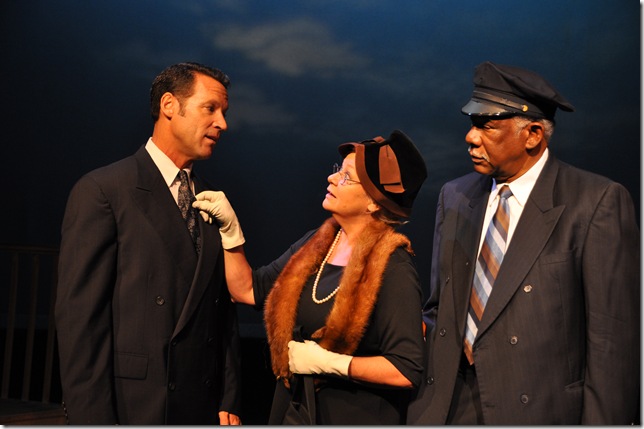By Dale King
Driving Miss Daisy is not a holiday play. Not even close.
But this light comedy about a black chauffeur hired to transport an elderly Jewish widow who is no longer capable of operating her car safely is a beautiful show – written with the smoothness of a heartwarming holiday production. It doesn’t jump headlong into matters of race or religion, of whether public school kids should sing Christmas carols or whether that greenery in your living room this time of year should be called a “holiday tree.”
Now being staged at the Delray Beach Playhouse, this calm and steady production is the handiwork of veteran director Randolph DelLago and a trio of great actors clearly steeped in bringing out the best in a show.
Driving Miss Daisy has some trouble spots. It progresses slowly. It is a single-act play presented over a 90-minute period with no intermission. Still, it is uplifting to see two people gently overcome their differences to become fast friends.
Playwright Alfred Uhry created this play as a series of vignettes. Each of them tells a small, but important story. The blackouts run progressively, with the relationship between Daisy and her driver slowly growing more caring and tender through their quarter-century together; the show covers the 25-year period from 1948 to 1973.
As the show begins, Daisy Werthan (Diane Gilch) — an elderly but still-sharp Jewish woman living in Atlanta during segregation — has just destroyed her Packard in a car accident. Her doting son, Boolie Werthan (Kevin Finneran), arrives to tell mom, once and for all, that she can no longer drive. In her stubborn, Southern way, she resists strongly. So Boolie goes back to his office and starts calling potential chauffeurs.
Hoke Coleburn (Tony Thompson) gingerly strides into his office looking for the job. Boolie seals the deal, but Miss Daisy rejects it. Still tainted with prejudice, she declares that Hoke will never drive her anywhere in Atlanta.
At first, he spends hours just waiting around her house, doing nothing. Finally, the shrewd chauffeur tricks her into letting him motor her to the Piggly Wiggly market. It upsets her that he takes a route different from the one she normally follows, but he gently eases her objections. The run to Piggly Wiggly seems to break some of the ice and, as time passes, a cautious sort of friendship springs up between them.
The vignettes are particularly telling. In one sketch, Daisy asks Hoke to read something. His head drops and he scuffs with embarrassment. He admits shyly that he never learned to read. In another, Daisy is sitting in the car, stopped, wondering why she cannot go ahead to the synagogue. Hoke checks the road and finds out the temple has been bombed. The angry deed causes Hoke to remember a lynching seen in his childhood.
In the Delray Playhouse version of Driving Miss Daisy, the cast is pressed with the task of maintaining audience interest in a play that develops slowly. They do an excellent job.
Gilch is a wonderful Daisy who captures the character’s idiosyncrasies with ease. Her portrayal is that of a woman who tries desperately not to give in to the aging process, who hangs onto her freedom at all costs. She does not go gently into that good night. She has had a lengthy career in acting and debuted at Delray in last year’s The Last Romance.
Just as proud and stubborn is Tony Thompson in his portrayal of Hoke. Not only does he bear a striking resemblance to Morgan Freeman, who played the role on stage and in film, but he handily masters the tricks and turns of Hoke’s character. Thompson is a veteran actor, director and playwright and winner of the Carbonell Pioneer Award.
Finneran plays the terse, but caring son with particular aplomb.
Driving Miss Daisy is actually the first of three plays Uhry wrote about Jews living in Atlanta during the early to mid-20th century. Second out was The Last Night of Ballyhoo, about an upscale Jewish family in 1939 that has apparently lost touch with its religious roots. Uhry completed his on-stage hat trick with a musical called Parade, about the 1913 trial of a Jewish factory manager, Leo Frank.
At Delray Playhouse, the tech crew (Chip Latimer, Cindi Taylor and Nick DiGirolamo) does an excellent job of carving three sets out of limited stage space. The “car” appears to be a riser with wooden chairs and an imaginary steering wheel. Daisy’s home is a nicely decorated section with a stairway that is usually her entryway. Her son’s office is mainly a desk and chair in the rear.
Though generally considered a comedy, which, in truth, it is, the play is a mainly a portrait of a changing society which ultimately ends on a bittersweet, but very uplifting note.
Driving Miss Daisy is playing through Sunday at the Delray Beach Playhouse, 950 NW 9th St., Delray Beach. For tickets, call (561) 272-1281, extension 4, or email delraybeachplayhouse@gmail.com.
